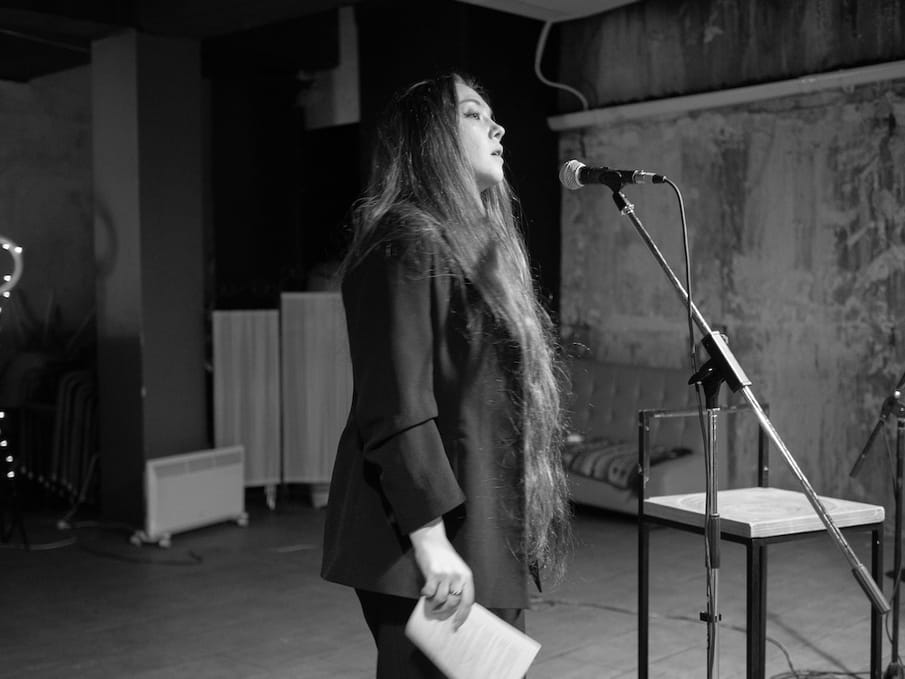Sharing your voice in local spaces could be a transformative, empowering experience that goes beyond having fun
I take a deep, calm breath, pick up the sheets of paper from the table in front of me, and walk to the front of the room. As I glance at the audience and adjust the microphone, I realise something surprising: I’m feeling good.
For the past year or so, I’ve been coming along to open mic nights in my adopted hometown of Stoke-on-Trent. I love listening to other people perform, and enjoy the sense of warmth, connection, and joy of this shared experience. Each time, I said to myself: “Maybe I should give it a go.”
Open mic nights take place across the country. They are often hosted in places like bars, cafes, arts venues, or libraries, and are a chance for anyone to perform, with several – sometimes dozens – of people taking to the stage each time. Some open mics are for any kind of performance – poetry, music, or comedy, for example – whereas others specialise in a certain art form.
“Whether you attend an open mic alone, in a group, stay in the audience, or dare to perform something, you enter a space where the point is to be reached, to reach back in response. And to be a part of something larger, beyond oneself, but also rooted in community,” says counsellor Louisa Harvey. “The oft-used term ‘self-help’ betrays the fact of our need to feel a part of something, to belong, to be in a community with people at the kind of distance that our neurodiversity, temperaments, confidence levels, and introversion/extroversion might suit.”
Open mics are a chance to connect with others. “They are potentially loneliness-busting, relationship-creating, emotionally moving, inspiring places that represent an honouring of courage, vulnerability, creativity, laughter, and meaning-making,” adds Louisa.

Taking centre stage at an open mic night
There is joy in watching others perform – and there shouldn’t be any pressure to read something if you don’t feel comfortable doing so. But there is also joy in getting up and sharing something you’ve created.
“A favourite spoken word poet of mine, Andrea Gibson, says: ‘We have to create; it is the only thing louder than destruction,’” Louisa tells me. “That destruction might be global, and it can also be explicitly self-destructive, or about the little ways in which we might sabotage ourselves or go against our better judgement in life, for whatever reason.
“To create and to share what one creates is to be vulnerable, to dare to take up space, to risk judgement, to take oneself seriously, to embody courage and to express something that might reach others. By doing so, we give ourselves the message that we are allowed these things, that there is strength in them, and we might find ourselves able to be softer with ourselves and others for it.
“In another life, some years back in East London, I ran poetry open mic nights for people who had mental health difficulties,” adds Louisa. “Tens of people came each month, some from outside of London, and they created a supportive, courageous, radically encouraging web that brought people together, who would not necessarily otherwise have crossed paths. Friendships were created in people who were otherwise socially isolated. Some of those are still connected now.”
Performing poetry
Buoyed by the sense of community and warmth at the events I’d been to, I decided I wanted to perform. I’d had a few ideas brewing for poems, and one lovely afternoon a friend and I sat together in a café and did some writing. The words flowed, and then I took the drafts home and edited the two poems, and felt happy with what I’d created.
Still, I was a little nervous about performing – and that’s a really normal way to feel.
Louisa gives the following tips for feeling more confident when performing at an open mic night:
-
Practise your piece.
-
Know that you are allowed to do it scared.
-
Picture someone in your life who really celebrates you without condition – or a character who embodies this if you don’t have this in your life – and metaphorically place them where you need them (e.g. beside you, or at the back of the room with a knowing smile).
-
If your limbs shake, move gently, don’t try harder to hold still, allow some movement, stim if you need to.
-
Remember that most members of the audience are rooting for you to do well, they want to listen, and they have applause or finger snaps waiting.
Appreciate yourself – doing this may give someone else a feeling that they can too. -
Afterwards, make sure to really acknowledge what you did, from creating to performing and all the bits in between.
I found practising reading my two poems out loud the day before helped me feel more comfortable. And, as Louisa says, I reminded myself that the people in the room would be supportive, and that there was nothing to worry about.
When my friend introduced me as the next poet, I took a calming breath, went up, read my two poems, and felt so proud of myself for giving it a go. I loved chatting to other people afterwards – one of my poems sparked an interesting conversation – and felt such happiness at being part of this community. And, I’m already drafting more poetry. So, who’s up next?


Comments